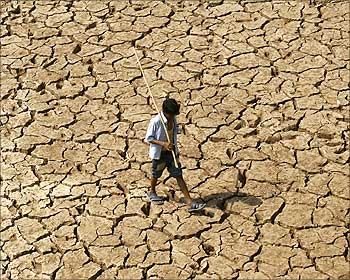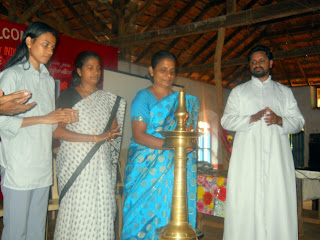കേരളം മരുഭൂമി ആവാതിരിക്കാന്
Posted on: 16 Mar 2010
-സുജാതന് മാവേലിക്കര
 ഭൂഗര്ഭ ജലനിരപ്പ് അനുദിനം കുറഞ്ഞുകൊണ്ടിരിക്കുകയാണ്. വേനല്ച്ചൂടിനു കാഠിന്യം സഹിക്കാവുന്നതിനുമപ്പുറമായി. സൂര്യാഘാത സാധ്യതയും മുമ്പെങ്ങുമില്ലാത്ത വിധം കേരളം അനുഭവിച്ചു തുടങ്ങി. കേരളത്തിനു കേട്ടുകേള്വിപോലുമില്ലാത്ത രീതിയില് താപനില 40 ഡിഗ്രി സെല്ഷ്യസ് ആയിരിക്കയാണിപ്പോള്. കേരളം മരുഭൂമിയാവാതിരിക്കാന് ജലസംരക്ഷണം അനിവാര്യമായിരിക്കുകയാണ്.
ഭൂഗര്ഭ ജലനിരപ്പ് അനുദിനം കുറഞ്ഞുകൊണ്ടിരിക്കുകയാണ്. വേനല്ച്ചൂടിനു കാഠിന്യം സഹിക്കാവുന്നതിനുമപ്പുറമായി. സൂര്യാഘാത സാധ്യതയും മുമ്പെങ്ങുമില്ലാത്ത വിധം കേരളം അനുഭവിച്ചു തുടങ്ങി. കേരളത്തിനു കേട്ടുകേള്വിപോലുമില്ലാത്ത രീതിയില് താപനില 40 ഡിഗ്രി സെല്ഷ്യസ് ആയിരിക്കയാണിപ്പോള്. കേരളം മരുഭൂമിയാവാതിരിക്കാന് ജലസംരക്ഷണം അനിവാര്യമായിരിക്കുകയാണ്.ജീവജാലങ്ങളുടെ നിലനില്പിനു ജലം അത്യന്താപേക്ഷിതമാണ്. വെള്ളത്തിനു പകരം ഉപയോഗിക്കാന് മറ്റൊരു വസ്തു ഇന്നേവരെ കണ്ടെത്തിയിട്ടില്ല. പാരിസ്ഥിതിക വ്യവസ്ഥയുടെ പരമോന്നത സ്ഥാനം വഹിക്കുന്ന ജീവജലത്തില് ഒരു തുള്ളിപോലും നശിപ്പിക്കുകയോ മലിനമാക്കുകയോ ചെയ്യരുതാത്തതാണ്. കാലപ്രവാഹത്തിന്റെ കുത്തൊഴുക്കില് പ്രകൃതിയെ മറക്കുന്ന പ്രവണത ഏറിവരികയും ജലം അന്യമാവുകയും ചെയ്തുകൊണ്ടിരിക്കുന്നു.
താപനില ഏറുന്നതിനൊപ്പം ഭൂമിയിലെ ജലനിരപ്പ് അനിയന്ത്രിതമായി താഴ്ന്നുകൊണ്ടിരിക്കുന്നതിനു നിരവധി കാരണങ്ങളുണ്ട്. നദികളുടെയും നീര്ത്തടങ്ങളുടെയും പാടങ്ങളുടെയും വനങ്ങളുടെയും നാശം മാത്രമല്ല, കായലുകളുടെ ആഴം കുറഞ്ഞതും ജലലഭ്യത കുറയാന് കാരണമായി. കാവും കുളവും സങ്കല്പമാകുന്നു. പ്രകൃതിയെ പൂജിക്കുന്ന വലിയൊരു സംസ്കാരമായിരുന്നു നമുക്കുണ്ടായിരുന്നത്.
ജലവും നദിയും മരവുമെല്ലാം നാം ആരാധനയോടെ നോക്കിക്കണ്ട കാലമുണ്ടായിരുന്നു. അതു മാറി താത്കാലിക ആവശ്യത്തിനായി ഏതിനെയും ചൂഷണം ചെയ്യുന്ന മനോഭാവം കടന്നുകൂടിയതോടെ പ്രകൃതിക്കു നാശം സംഭവിച്ചുതുടങ്ങി. അനിയന്ത്രിതമായി പ്രകൃതിചൂഷണം ചെയ്യുന്ന നിലപാടിനു മാറ്റമുണ്ടായെങ്കിലേ ജലദൗര്ലഭ്യവും താപവര്ധനയും മൂലം വരാന് പോകുന്ന പ്രകൃതിദുരന്തങ്ങള്ക്ക് ആക്കം കുറയ്ക്കാനെങ്കിലും കഴിയൂ.
സമൂഹത്തിന്റെ സര്വവിധ സാമൂഹിക, സാമ്പത്തിക വികസനത്തിലും ജലം സുപ്രധാന പങ്കാണ് വഹിക്കുന്നത്. ജലം ധാരാളമുണ്ടെന്ന് പൊതുവെ പറയാറുണ്ടെങ്കിലും തികച്ചും പരിമിതമായ ഒരു പ്രകൃതിവിഭവമാണിത്. ഭാരതത്തില് ആളോഹരി ശുദ്ധജല ലഭ്യത 1947-ല് 6000 ഘനമീറ്ററായിരുന്നത് 2000-ത്തില് 2200 ഘനമീറ്ററായി കുറഞ്ഞു.
ഇന്ത്യയില് 4,00,000 കോടി ഘനമീറ്റര് വെള്ളം പ്രതിവര്ഷം ലഭിക്കുന്നുണ്ടെന്നാണ് കണക്ക്. അതില് ഉപയോഗിക്കാന് കഴിയുന്നത് 1,08,600 കോടി ഘനമീറ്റര് മാത്രമാണ്. നാലുതരത്തിലാണ് ജലമുള്ളത്. മഴവെള്ളം, ഹിമപാതം, തുഷാരം, ഹൈമം എന്നിങ്ങനെ. ഇതില് മഴവെള്ളമാണ് ഏറ്റവും ശ്രേഷ്ഠവും ഗുണകരവും . ജലസമ്പത്തിന്റെ നിദാനവും ജല സംക്രമണവും നടത്തുന്നത് പ്രധാനമായും നദികളെ ആശ്രയിച്ചാണ്. നദികള് ജീവന്റെ നിലനില്പിനെ സഹായിക്കുന്ന ഏറ്റവും പ്രധാന ജൈവ ആവാസവ്യവസ്ഥയാണ്. തടസ്സമില്ലാതെ ഒഴുകുന്ന ജലവും മണലും ജല ജീവികളുമെല്ലാം ഈ ആവാസവ്യസ്ഥയുടെ അവിഭാജ്യ ഘടകമാണ്. നദികളെ കേന്ദ്രീകരിച്ചാണ് മനുഷ്യസംസ്കാരങ്ങള് വളര്ന്നുവന്നിട്ടുളളത്.
നദികള്കൊണ്ട് കേരളം സമ്പന്നമാണ്. പശ്ചിമഘട്ട മലനിരകളില്നിന്നുത്ഭവിച്ച് പടിഞ്ഞാറോട്ട്ഒഴുകുന്ന 41 നദികളും കിഴക്കോട്ടൊഴുകി കാവേരിയില് ചേരുന്ന മൂന്നു നദികളും അവയുടെ 900-ത്തിലധികം വരുന്ന പോഷകനദികളും സംസ്ഥാനത്തെ ജല സമ്പുഷ്ടമാക്കാന് പര്യാപ്തമാണ്. 15 കി. മീറ്ററില് അധികം നീളം വരുന്ന ജലസ്രോതസ്സുകളെയാണ് നദികളെന്ന് കേരളത്തില് കണക്കാക്കുന്നത്. 44 നദികളും 38 കായലുകളും 560 കി. മീറ്റര് നീളം വരുന്ന സമുദ്രതീരവും മണല്പ്പരപ്പും കാടും മലയും താഴ്വരകളുമെല്ലാം ചേരുമ്പോള് കേരളം ദൈവത്തിന്റെ സ്വന്തം നാടാവുന്നു.
ലോകത്ത് ഏറ്റവും കൂടുതല് കിണറുകളുള്ള നാടാണ് കേരളം. 45 ലക്ഷത്തോളം കിണറുകള് നമ്മുടെ ഭൂഗര്ഭ ജലവിതാനത്തിന്റെ വിസ്തൃതി വെളിവാക്കുന്നതാണ്. ജല സമ്പുഷ്ടിക്കുതകുന്ന പ്രവര്ത്തനങ്ങള് കിണറുകളെയെല്ലാം ജല സമ്പുഷ്ടമാക്കിയിരുന്നു. എന്നാല് സ്ഥിതി മാറി വരികയാണ്. കഴിഞ്ഞ നൂറു വര്ഷങ്ങള്ക്കുള്ളില് ഇന്ത്യയില് ആളോഹരി ജലലഭ്യത നാലിലൊന്നായി കുറഞ്ഞപ്പോള് കേരളത്തില് അത് അഞ്ചിലൊന്നായി. ദേശീയ ശരാശരിയേക്കാളും 2.78 മടങ്ങ് മഴ കേരളത്തില് ലഭിക്കുന്നുണ്ട്. എന്നാല് ഇതില് ഉപയോഗിക്കുന്നത് നാമമാത്രവും.
കേരളത്തില് ആളോഹരി ശുദ്ധജല ലഭ്യത കുറഞ്ഞു കൊണ്ടിരിക്കുകയാണ്. കൂടുതല് ജലവും ഉപയോഗിക്കുന്നതു കൃഷിക്കും വ്യവസായങ്ങള്ക്കുമാണ്. ഇതില് അഞ്ചുശതമാനം മാത്രമാണ് വീട്ടാവശ്യത്തിനായി ഉപയോഗിക്കുന്നത്. ഉപരിജല ലഭ്യത കുറഞ്ഞതോടെ നാം ഭൂഗര്ഭജലത്തെ അമിതമായി ഉപയോഗിച്ചു തുടങ്ങി. മഴക്കാലത്ത് പുനഃസ്ഥാപിക്കാന് കഴിയുന്നതിനേക്കാള് പതിന്മടങ്ങ് ഉപയോഗിക്കുന്നതിനാല് ഭൂഗര്ഭജല വിതാനം നാള്ക്കുനാള് താഴ്ന്നുകൊണ്ടിരിക്കുന്നു. കേരളത്തിലെ കിണറുകളിലെ ജലവിതാനം അഞ്ചു വര്ഷത്തിനുള്ളില് മൂന്നു മീറ്റര് വരെ താഴ്ന്നതായി ഭൂഗര്ഭ ജലവിഭവവകുപ്പ് കണ്ടെത്തിയിട്ടുണ്ട്. വരും വര്ഷങ്ങളില് നമ്മുടെ ഒട്ടുമിക്ക കിണറുകളും വറ്റി വരളുമെന്നും ശാസ്ത്രജ്ഞന്മാര് പറയുന്നു.
ജല ദുരുപയോഗത്തിലും കേരളം ഒന്നാം സ്ഥാനത്താണ്. ലോകാരോഗ്യ സംഘടനയുടെ കണക്കനുസരിച്ച് ആളോഹരി ജല ഉപയോഗം പ്രതിദിനം 120 ലിറ്ററാണ്. കേരളത്തില് ഇത് 200 ലിറ്ററായി ഉയര്ന്ന് നില്ക്കുന്നു.അധികം ജലമുണ്ടെന്ന ധാരണയാണ് നമ്മുടെ പ്രതിസന്ധിക്കു കാരണം. സൂക്ഷ്മമായി കൈകാര്യം ചെയ്യേണ്ട വസ്തുവാണ് ജലമെന്ന് ബന്ധപ്പെട്ടവരാരും കരുതുന്നില്ല.
നദികളുടെ പാരിസ്ഥിതിക തകര്ച്ചയാണ് ജല സംഭരണശേഷിയെ കുറച്ചത്. അനിയന്ത്രിതവും അശാസ്ത്രീയവുമായ മണല്വാരല് മൂലം നദികളുടെ അടിത്തട്ട് വന്തോതില് താഴ്ന്നു. ഇക്കാരണത്താല് നദീതീരത്തെ ഭൂഗര്ഭജല വിതാനവും കുറഞ്ഞു. മഴക്കാലം തീര്ന്നാല് ശുദ്ധജലക്ഷാമവും തുടങ്ങുകയായി. ഇത് അടുത്ത കാലത്തെ പ്രതിഭാസമാണ്. ഭൂഗര്ഭജല വിതാനം ഭയാനകമാംവിധം താഴ്ന്നുകൊണ്ടിരിക്കുകയാണെന്ന സത്യം മലയാളികള് മനസ്സിലാക്കുന്നുമില്ല. കേരളത്തിലെ മിക്ക നദികളും മണല്വാരലിന്റെ ക്രൂരത അനുഭവിക്കുന്നവയാണ്. മൂന്നു മീറ്റര് മുതല് ആറു മീറ്റര് വരെ താഴ്ന്ന നദികളുടെ അടിത്തട്ടില് ചെളിയാണിപ്പോള്. മണല്ത്തിട്ടകള് പ്രകൃതി നല്കിയ ജലനിയന്ത്രണോപാധിയാണ്. ഇതിനെ പാടേ മാറ്റിയതോടെ പെയ്തവെള്ളം കുത്തൊഴുക്കില് പോയിമറയുന്നു.
മണല്വാരല് രൂക്ഷമായതോടെ പലനദികളും മരിച്ചു. ഒട്ടുമിക്ക നദികളുടെയും മധ്യത്തില് മണ്തിട്ടകളും മരങ്ങളും വ്യാപിക്കുന്നു. അടിത്തട്ട് താണ് 30 കി. മീറ്റര് ഉള്ളിലേക്കു വരെ ഓരുജലം കണ്ടുതുടങ്ങി. ശുദ്ധജല മത്സ്യങ്ങളുടെ വംശനാശത്തിനും ഇതു കാരണമായി.
നദീതീരങ്ങളില് മുന്പ് കുളം കുത്തിയാലും ജല പ്രളയമായിരുന്നു. ഈ സ്ഥാനത്ത് കുഴല്ക്കിണര് കുഴിച്ചാലും ചില സ്ഥലങ്ങളില് വെള്ളം കണ്ടെത്താന് കഴിയുന്നില്ല.
നദികളുടെ നാശം ഭൂഗര്ഭജല വിതാനം ക്രമാതീതമായി താഴേക്കു പോകാന് കാരണമായി. ഇതോടൊപ്പം പാടങ്ങള് വ്യാപകമായി ഇല്ലാതായതും കേരളത്തില് ഭൂഗര്ഭ ജലനിരപ്പ് താഴാന് കാരണമാണ്.മൂന്നുനാലു ദശാബ്ദങ്ങള്ക്കുള്ളില് പാടങ്ങളുടെ സിംഹഭാഗവും വീടുകളും ഫ്ളാറ്റുകളുമായി. വെള്ളം സംഭരിച്ചുനിര്ത്തുന്നതില് പാടശേഖരങ്ങള് വലിയൊരു പങ്കുവഹിച്ചിരുന്നു. പാടശേഖരങ്ങളെയും നശിപ്പിക്കുന്ന മറ്റൊരു പ്രവര്ത്തനമാണ് മണ്ണെടുപ്പ്. ചെളിക്കു വേണ്ടി ആയിരക്കണക്കിനു ഹെക്ടര് സ്ഥലം കുഴിച്ചു കുളം തോണ്ടുന്നു. മലകളെ ഒന്നായി ഇടിച്ചുനിരത്തി മണ്ണെടുക്കുമ്പോള് ഒരു പ്രദേശത്തിന്റെ ആവാസവ്യവസ്ഥ ഒന്നടങ്കമാണ് താറുമാറാകുന്നത്.
മരങ്ങളും ചെടികളും പുല്ലും നിറഞ്ഞ പ്രദേശത്ത് ഭൂമി നല്ലൊരു ജലസംഭരണ കേന്ദ്രമാകും. ഇതെല്ലാം നശിപ്പിച്ച് മണ്ണു മാന്തി എടുക്കുന്നതോടെ പെയ്ത വെള്ളം താഴാതെ ഒഴുകി മാറുന്നു.കായല്പ്രദേശങ്ങള് ഭൂമിയിലെ ജലസമ്പത്ത് നിലനിര്ത്തുന്ന ഘടകമാണ്. ഏഴുമീറ്റര് വരെ ആഴമുണ്ടായിരുന്ന നമ്മുടെ കായല്പ്രദേശങ്ങള്ക്ക് ഇപ്പോള് മൂന്നു മീറ്ററിലും താഴെയാണ് ആഴം. നദികളില്നിന്നൊഴുകി വരുന്ന എക്കലും മണ്ണും സമീപപ്രദേശങ്ങളിലെ മാലിന്യവുമെല്ലാം നിറഞ്ഞ് നീര്ത്തടങ്ങള് മരണവക്ത്രത്തിലായിക്കൊണ്ടിരിക്കുന്നു.
കേരളത്തിലെ ശുദ്ധജല നീര്ത്തടങ്ങളുടെ ആഴവും വിസ്തൃതിയും വര്ധിപ്പിച്ച് മഴക്കാലത്ത് കിട്ടുന്ന ഉപരിതലജലം കഴിയുന്നത്ര സംഭരിച്ചുനിര്ത്താന് കഴിയണം. നദികളും മരങ്ങളും വനങ്ങളും പാടങ്ങളും സംരക്ഷിക്കപ്പെടണം. ശീതോഷ്ണസ്ഥിതി ക്രമീകരിക്കുന്നതിനും ഇത് അനിവാര്യമാണ്.
പ്രകൃതിയുടെ തനതു ഭാവത്തെ തകര്ത്ത് താത്കാലിക ലാഭത്തിനുവേണ്ടിയുള്ള മനുഷ്യന്റെ പ്രവര്ത്തനം ജീവജലത്തെ ഉന്മൂലനം ചെയ്തുകൊണ്ടിരിക്കുന്നു. വറുതിയുടെ താണ്ഡവം വരുംനാളുകളില് അതിരൂക്ഷമാകും. കേരളത്തില് സൂര്യതാപമേറ്റ് അവശരാകുന്നവര് വ്യാപകമാവുകയാണ്. നാളെ കുടിവെള്ളത്തിനായി ഒരു യുദ്ധം നടക്കേണ്ടിവന്നാലും അതിശയിക്കാനില്ല. കാലങ്ങളായുള്ള അശ്രദ്ധമായ പ്രവര്ത്തനവും അമിത ചൂഷണവും ഹരിതാഭമായ കേരളത്തെ മരുഭൂമിയാക്കുകയാണ്. വരും തലമുറയ്ക്കായി ഒരുതുള്ളി ജീവജലത്തിനു വേണ്ടിയെങ്കിലും നാം ഇനിയും വൈകാതെ പ്രകൃതിയുടെ തനിമ നിലനിര്ത്താനുതകുന്ന പ്രവര്ത്തനങ്ങളിലേക്കു മടങ്ങണം.
Thursday, September 01, 2011














